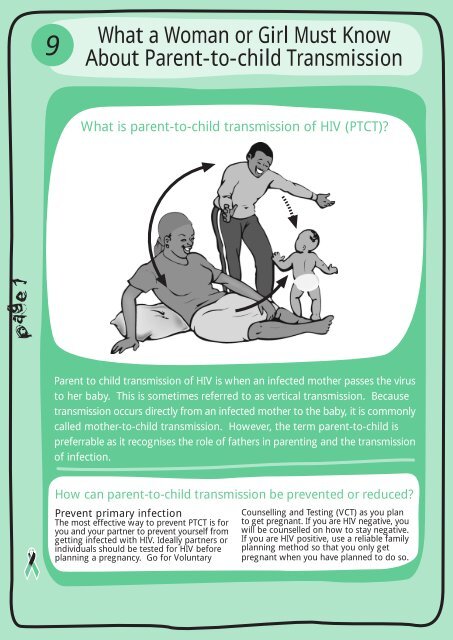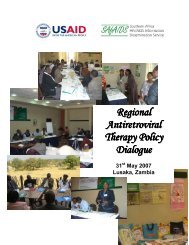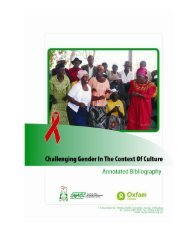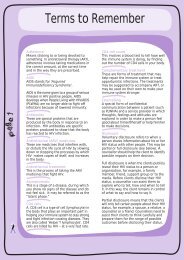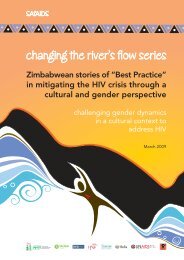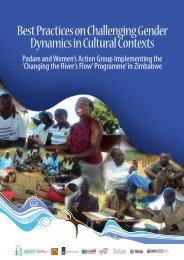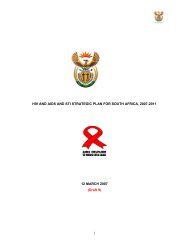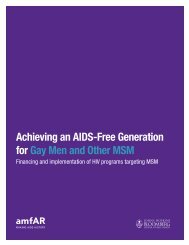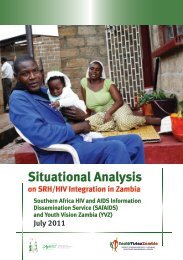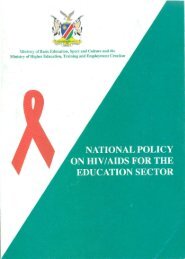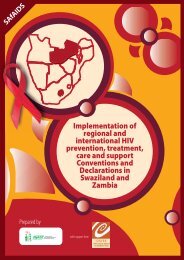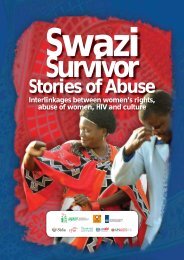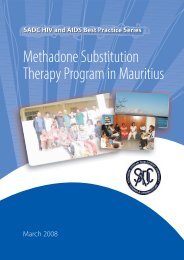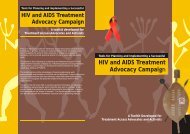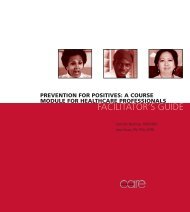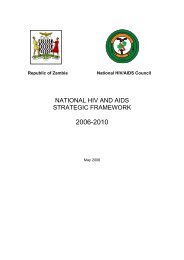What Women must Know About PTCT - SAfAIDS
What Women must Know About PTCT - SAfAIDS
What Women must Know About PTCT - SAfAIDS
You also want an ePaper? Increase the reach of your titles
YUMPU automatically turns print PDFs into web optimized ePapers that Google loves.
9<br />
<strong>What</strong> a Woman or Girl Must <strong>Know</strong><br />
<strong>About</strong> Parent-to-child Transmission<br />
<strong>What</strong> is parent-to-child transmission of HIV (<strong>PTCT</strong>)?<br />
Parent to child transmission of HIV is when an infected mother passes the virus<br />
to her baby. This is sometimes referred to as vertical transmission. Because<br />
transmission occurs directly from an infected mother to the baby, it is commonly<br />
called mother-to-child transmission. However, the term parent-to-child is<br />
preferrable as it recognises the role of fathers in parenting and the transmission<br />
of infection.<br />
How can parent-to-child transmission be prevented or reduced?<br />
Prevent primary infection<br />
The most effective way to prevent <strong>PTCT</strong> is for<br />
you and your partner to prevent yourself from<br />
getting infected with HIV. Ideally partners or<br />
individuals should be tested for HIV before<br />
planning a pregnancy. Go for Voluntary<br />
Counselling and Testing (VCT) as you plan<br />
to get pregnant. If you are HIV negative, you<br />
will be counselled on how to stay negative.<br />
If you are HIV positive, use a reliable family<br />
planning method so that you only get<br />
pregnant when you have planned to do so.
If you are pregnant and are HIV negative, you<br />
need to be counselled on safer sex practices<br />
because you can get infected with HIV while<br />
you are pregnant.<br />
Reduce the amount of virus in your<br />
body during pregnancy<br />
Having a high amount of virus in your body increases<br />
the chances of the virus being passed on to the<br />
baby. Therefore, when you are pregnant, it is very<br />
important that you do not get a high viral load.<br />
You may be given ARV medicines in order to reduce<br />
the amount of virus in your body. It is possible that<br />
you might be given the ARV medicines only during<br />
pregnancy or during labour. In most cases you get<br />
Nevirapine, which is also given to the baby just<br />
after delivery. You can also be started on a full<br />
course of ART. It is important for you to talk to<br />
your doctor and understand which course you are<br />
on. Be involved in deciding the care that you receive.<br />
Antenatal Care<br />
Care given to a pregnant woman<br />
is called Antenatal Care (ANC).<br />
The aim of this care is to make<br />
sure that you and the baby stay<br />
healthy throughout pregnancy,<br />
at delivery and afterwards.<br />
Therefore this care is very important<br />
to both HIV negative and HIV<br />
positive women. As you go for<br />
ANC, you need to inform the<br />
doctor or midwife that you are<br />
HIV positive so that you can discuss<br />
the care that you receive during<br />
pregnancy and plan for a safer<br />
method of delivery. VCT can be<br />
part of antenatal care so you may<br />
find out that you are HIV positive<br />
when you are already pregnant.<br />
It is possible that you get pregnant while you are<br />
already on a course of ARV medicines. DO NOT<br />
STOP TAKING YOUR ARV MEDICINES because you<br />
have found out that you are pregnant. As you<br />
attend ANC, you need to inform the doctor or<br />
midwife that you are taking ARV medicines so<br />
that they are careful of what medicines to give<br />
you as they attend to you. You also need to<br />
inform the doctor who has been looking after<br />
you that you are now pregnant so that ARV<br />
medicine doses may be adjusted since you may<br />
have gained weight because of the pregnancy.
Make sure not<br />
to get infected with<br />
HIV while you are<br />
pregnant!!! Use male<br />
or female condoms<br />
each time you<br />
have sex...<br />
As part of ANC, you shall receive some iron<br />
tablets and vitamins to make sure that you<br />
have enough blood. You may also get injections<br />
that help prevent tetanus. If you are HIV positive,<br />
you will receive medicines that help you not to<br />
get infected with TB, malaria and pneumonia.<br />
Ask your doctor about all these medicines. As<br />
pregnancy progresses, the baby inside you<br />
should be growing, and should gain weight.<br />
If you have weight loss or are not gaining<br />
weight when you are pregnant, you should go<br />
and see your health care provider. A healthy<br />
diet is very important during pregnancy.<br />
<strong>What</strong> should I eat?<br />
While you are still pregnant, it is very important<br />
for you to discuss with the doctor or counsellor<br />
how you will deliver.<br />
As you give birth, efforts are made to reduce<br />
the chances of the baby getting into contact<br />
with fluids that have the virus.<br />
At birth, usually the baby passes through the<br />
birth canal, which is made up of the vagina and<br />
part of the womb called the cervix. This passage<br />
always has some fluids. If you are HIV positive,<br />
these fluids contain HIV. If the baby gets in<br />
contact with the fluids, he/she may get infected.<br />
You need to eat a balanced diet. The following<br />
are food groups that you need to know about:<br />
1. Energy giving foods – carbohydrates like<br />
bread, cereals – maize, rice, wheat, potatoes.<br />
2. Body building foods– foods with proteins<br />
– meat, milk, beans, ground nuts, eggs.<br />
3. Oils – foods that give extra energy – peanut<br />
butter, margarine, cooking oil.<br />
4. Protective foods – with vitamins and<br />
minerals mainly fruits and vegetables (even<br />
wild fruits and indigenous vegetables).<br />
Eating a balanced diet is having food from<br />
each food-group everyday. This helps women<br />
who are HIV positive or HIV negative, stay<br />
healthy and strong.<br />
Baby in<br />
womb<br />
Backbone<br />
Birth<br />
canal
Efforts are made to make sure that the fluids<br />
have very little virus by having you take ARV<br />
medicines (short course taken as soon as labour<br />
starts or the long course of ART). There is blood<br />
involved in childbirth. Blood has HIV, so you<br />
want as little blood as possible to be in contact<br />
with the baby. At times, the choice can be that<br />
the baby does not pass through the birth canal<br />
at all. This is when the baby is born by an<br />
operation called a Caesarean Section.<br />
The following are factors that may increase<br />
risk of transmission during labor:<br />
· Vaginal delivery<br />
· A long time after waters are broken, but<br />
baby has not been delivered<br />
· Heavy bleeding during delivery<br />
· A delivery where some instruments are<br />
used to assist the baby to come out<br />
ARV medicines may interfere with some of the<br />
medicines that are used in labour. Therefore<br />
you should let health care staff know that you<br />
are taking ARV medicines.<br />
It is very important that you let the maternity<br />
staff know that you are HIV positive so that your<br />
baby gets special care.<br />
After delivery<br />
Before you get pregnant and or while you are<br />
still pregnant, you need to get information about<br />
the choices that you have on feeding your baby.<br />
Although breast milk is the best feed for a baby,<br />
it may not be safe for you to breast feed if you<br />
are HIV positive. You need to discuss with your<br />
counsellor what is best for your lifestyle.<br />
As much as possible, involve your partner and<br />
or someone supportive, in these discussions.<br />
If you are HIV positive, breast milk contains<br />
HIV and it is possible for the baby to get<br />
infected with HIV while breast -feeding.<br />
Chances of the baby getting infected through<br />
breast feeding increase if any or some of the<br />
following situations are happening:<br />
· If the mother has a high viral load<br />
· If the breasts have sores, cracked nipples,<br />
are swollen and painful, have a boil<br />
· If the baby is exposed to the virus in breast<br />
milk for a long time- long duration breast<br />
feeding ie breast feeding for over six months.<br />
· If the baby is getting both breast milk as<br />
well as other feeds like cow’s milk, powder<br />
milk and so on<br />
· If the baby has oral thrush<br />
Talk to your counsellor or health care provider<br />
about the choices that you have. Safer breastfeeding<br />
involves the following:<br />
· Exclusive breast feeding – giving the baby<br />
breast milk only and nothing else- not even<br />
water till the baby is six months old.<br />
· Good breast feeding technique – positioning<br />
of the breast into the baby’s mouth so that<br />
the baby grips not only the nipple but the<br />
whole dark area around the nipple<br />
· Early treatment of breast problems in the<br />
mother and oral thrush in the baby<br />
· Safer sex – use of male and/or female<br />
condoms during the time that you are<br />
breast feeding.


